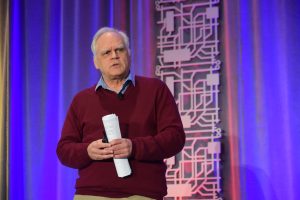It is telling that when Quadrangle Architects principal Les Klein is asked to name the most notable structures that his partnering co-founder, the late Brian Curtner, was involved with, Klein starts to discuss the relationships, not the edifices, that Curtner built during his career.
Curtner died Aug. 15 at the age of 64 after a battle with cancer, leaving a legacy of important urban structures in his home base of Toronto that included the award-winning BMW showroom at the base of the Don Valley Parkway, the Corus Entertainment headquarters on the waterfront and 130 Bloor Street West in Yorkville, a condominium development built on top of an existing modernist office tower that earned an Innovation in Architecture award from the Royal Architectural Institute of Canada.
One of his last projects, the $300-million multi-use redevelopment of the Yonge-Sheppard Centre, was recently approved by Toronto council.
Curtner joined forces with Klein in 1986 to found Quadrangle and they built the firm from 24 employees to its current 140. Curtner spearheaded the firm’s expansion internationally, and took on projects in Dubai and China.
But Klein stressed that the growth was best examined not in buildings completed but in terms of intangibles.
"Brian and I both believed strongly that projects are equally as important as relationships, and that is what he was most proud of," said Klein over the phone recently, sounding wistful as he waded back through 29 years spent working with his partner.
"There were relationships built over 20, 25, nearly 30 years with some people on project after project after project and at the same time building friendships that went far beyond the workplace and became part of his very fibre. That is one of the things that made working with Brian very special, you knew that the person you were working with was not just a professional, you were working with a real person who cared about you and cared about the project equally."
Make no mistake, Klein said, the qualities of the man translated directly to success for the firm. Curtner, said Klein, brought out the best in people; he never accepted mediocrity; he was a pragmatist yet also an idealist; and he had an "amazing eye for design."
"One of our guidelines is that we never rested on our laurels, we never said, this is as good as it can possibly be," Klein said. "We tested ourselves and each other and said, Can we make this project better? And as such, we attracted people who wanted our unique combination of design skills and business acumen. Our work was almost exclusively in the private sector and we worked with idea-based entrepreneurs, people who were willing to put a lot on the line to see their ideas come to fruition."
One of the firm’s mottos was also Curtner’s personal philosophy of life, said Klein: "inspiration realized."
"We didn’t just want to have inspiration, we wanted to see them built. One of the keys for Brian was to see an idea hatched that he had had long, long before, turned into a reality."
Curtner, a graduate of the Architectural Association School of Architecture in London, England, was licensed to practice in eight Canadian provinces. He specialized in adaptive reuse of urban properties, said Klein, and believed in cities as "the greatest construct that humanity has ever been created" and so brought that ethos to every project.
"Starting early on with the BMW showroom at the foot of the Don Valley, so many people forget that that was a 1950s office building for Lever Brothers," Klein said. Curtner excelled in this type of project, "to be able to see what that could be, and to see what you could get out of working with an existing building instead of tearing it down."
Working on 30 Bloor Street in Yorkville, Curtson enjoyed tackling an iconic 1960s building to create 17 new residences, said Klein.
"Far more than giving it a new life, it is giving it new identity and recognizing it has got to work on all kinds of levels, and the complexity of weaving new structures through an existing building and keeping an operation going while all that was going on…that was the kind of thing that turned his crank."
Curtner leaves his wife, Christine Raissis, along with two children, two step-children and two grandchildren. There will be a memorial service at the Corus building on Corus Quay on Sept. 25. Curtner’s family welcomes donations to either the Temmy Latner Centre for Palliative Care at Mount Sinai Hospital or Sunnybrook Hospital’s Odette Cancer Centre in his memory.
Follow Don Wall on Twitter @DonWall_DCN.




Recent Comments
comments for this post are closed